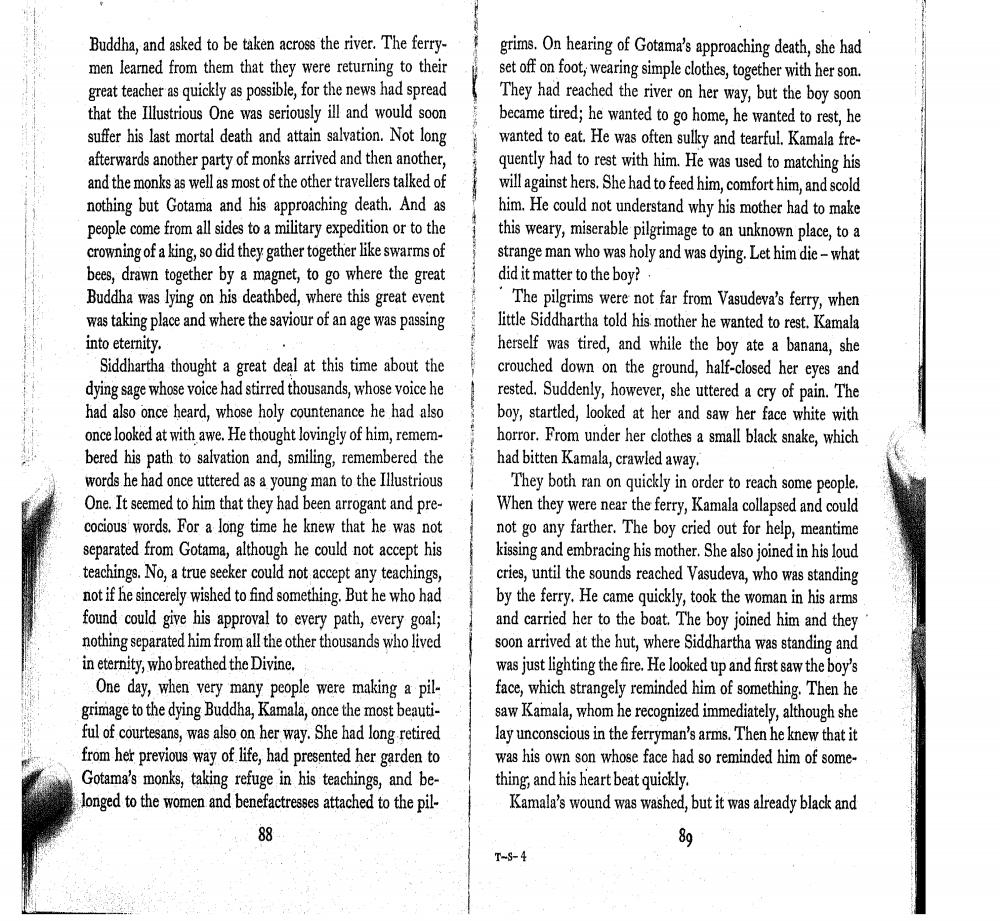________________
Buddha, and asked to be taken across the river. The ferrymen learned from them that they were returning to their great teacher as quickly as possible, for the news had spread that the Illustrious One was seriously ill and would soon suffer his last mortal death and attain salvation. Not long afterwards another party of monks arrived and then another, and the monks as well as most of the other travellers talked of nothing but Gotama and his approaching death. And as people come from all sides to a military expedition or to the crowning of a king, so did they gather together like swarms of bees, drawn together by a magnet, to go where the great Buddha was lying on his deathbed, where this great event was taking place and where the saviour of an age was passing into eternity.
Siddhartha thought a great deal at this time about the dying sage whose voice had stirred thousands, whose voice he had also once heard, whose holy countenance he had also once looked at with awe. He thought lovingly of him, remembered his path to salvation and, smiling, remembered the words he had once uttered as a young man to the Illustrious One. It seemed to him that they had been arrogant and precocious words. For a long time he knew that he was not separated from Gotama, although he could not accept his teachings. No, a true seeker could not accept any teachings, not if he sincerely wished to find something. But he who had found could give his approval to every path, every goal; nothing separated him from all the other thousands who lived in eternity, who breathed the Divine.
One day, when very many people were making a pilgrimage to the dying Buddha, Kamala, once the most beautiful of courtesans, was also on her way. She had long retired from her previous way of life, had presented her garden to Gotama's monks, taking refuge in his teachings, and belonged to the women and benefactresses attached to the pil
grims. On hearing of Gotama's approaching death, she had set off on foot, wearing simple clothes, together with her son. They had reached the river on her way, but the boy soon became tired; he wanted to go home, he wanted to rest, he wanted to eat. He was often sulky and tearful. Kamala frequently had to rest with him. He was used to matching his will against hers. She had to feed him, comfort him, and scold him. He could not understand why his mother had to make this weary, miserable pilgrimage to an unknown place, to a strange man who was holy and was dying. Let him die-what did it matter to the boy!
The pilgrims were not far from Vasudeva's ferry, when little Siddhartha told his mother he wanted to rest. Kamala herself was tired, and while the boy ate a banana, she crouched down on the ground, half-closed her eyes and rested. Suddenly, however, she uttered a cry of pain. The boy, startled, looked at her and saw her face white with horror. From under her clothes a small black snake, which had bitten Kamala, crawled away.
They both ran on quickly in order to reach some people. When they were near the ferry, Kamala collapsed and could not go any farther. The boy cried out for help, meantime kissing and embracing his mother. She also joined in his loud cries, until the sounds reached Vasudeva, who was standing by the ferry. He came quickly, took the woman in his arms and carried her to the boat. The boy joined him and they soon arrived at the hut, where Siddhartha was standing and was just lighting the fire. He looked up and first saw the boy's face, which strangely reminded him of something. Then he saw Kamala, whom he recognized immediately, although she lay unconscious in the ferryman's arms. Then he knew that it was his own son whose face had so reminded him of something, and his heart beat quickly.
Kamala's wound was washed, but it was already black and
88
80
T-S-4




